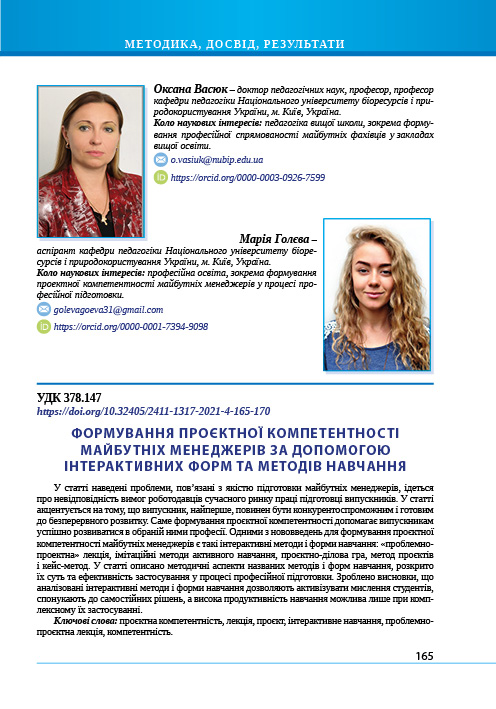Abstract
The article presents problems related to the quality of training of future managers, i. e., non-
compliance with the requirements of employers in the modern labor market of graduate training. Not all existing methods and forms of training contribute to the proper level of project competence formation. The article emphasizes that the graduate, first of all, must be competitive and ready for continuous development. The project competence of the manager is characterized by his ability and willingness to apply knowledge, skills and personal qualities that will ensure the success of project activities, awareness of the social significance of the manager’s profession and personal responsibility for the result. Project competence is a component of a complex system of professional competence, due to a set of certain personality traits, its high level of professional readiness for project activities. Thus, an integral part of the educational process aimed at solving this problem is interactive learning, carried out in various forms of joint activities of students. One of the innovations for the competent formation of project competence in the training of future managers is the following interactive methods and forms of learning: “problem-project” lecture, simulation methods of active learning, project-business game, project method and case method. The article describes the methodological aspects of these methods and forms of teaching. It is concluded that the considered interactive methods and forms of learning allow to activate students’ thinking, to intensify the development of students’ independent decisions that will ensure greater learning productivity. In the formation of project competence of future managers, the greatest effect is the complex application of such forms and methods of interactive learning as “problem-project” lecture, simulation methods of active learning, project-business game, project method and case method.
References
Парфёнова, Т. А. (2018). Формирование проектной компетентности будущих педагогов начальной школы: дис. канд. педагог. наук. Самарский государственный социально-педагогический университет. Самара, Россия.
Серякова, С. Б. (2012). Компетентностный подход в образовании: от теории к практике. Совет ректоров. (4). 34–40.
Мельничук, І. В., Цибух, Л. М. (2017). Використання інноваційних методів під час роботи із студентами-психологами. Science and Education a New Dimension. Pedagogy and Psychology. (V, 58). 71–72.
Баранов, А. А., Шарафутдинов, Р. Н. (2016). Формирование и развитие проектной компетентности как условие становления инновационного потенциала бакалавров педагогического образования и профессионального обучения. Вестник Удмуртского государственного университета. (3). 103–109.
Сластёнин, В. А., Подимова, Л. С. (2007). Готовность педагога к инновационной деятельности. Сибирский педагогический журнал. (1). 42–49.
Касьянов, О. В. (2007). Проектна технологія у навчально-виховному процесі: посіб. для самостійної роботи слухачів курсів підвищення кваліфікації. Луганськ, Україна.
Сиденко А. С. (2003). Метод проектов: история и практика применения. Завуч для адм. шк. (6). 96–111.
Parfjonova, T. A. (2018). Formirovanie proektnoj kompetentnosti budushhih pedagogov nachal’noj shkoly: dis. kand. pedagog. nauk. Samarskij gosudarstvennyj social’no-pedagogicheskij universitet. Samara, Rossija. (in Russian).
Serjakova, S. B. (2012). Kompetentnostnyj podhod v obrazovanii: ot teorii k praktike. Sovet rektorov. (4). 34–40. (in Russian).
Mel`ny`chuk, I. V., Cy`bux, L. M. (2017). Vy`kory`stannya innovacijny`x metodiv pid chas roboty` iz studentamy`-psy`xologamy`. Science and Education a New Dimension. Pedagogy and Psychology. (V, 58). 71–72. (in Ukrainian).
Baranov, A. A., Sharafutdinov, R. N. (2016). Formirovanie i razvitie proektnoj kompetentnosti kak uslovie stanovlenija innovacionnogo potenciala bakalavrov pedagogicheskogo obrazovanija i professional’nogo obuchenija. Vestnik Udmurtskogo gosudarstvennogo universiteta. (3). 103–109. (in Russian).
Slastjonin, V. A., Podimova, L. S. (2007). Gotovnost’ pedagoga k innovacionnoj dejatel’nosti. Sibirskij pedagogicheskij zhurnal. (1). 42–49. (in Russian).
Kas`yanov, O. V. (2007). Proektna texnologiya u navchal`no-vy`xovnomu procesi: posib. dlya samostijnoyi roboty` sluxachiv kursiv pidvy`shhennya kvalifikaciyi. Lugans`k, Ukrayina. (in Ukrainian).
Sidenko A. S. (2003). Metod proektov: istorija i praktika primenenija. Zavuch dlja adm. shk. (6). 96–111. (in Russian).

This work is licensed under a Creative Commons Attribution-NonCommercial-ShareAlike 4.0 International License.
Copyright (c) 2021 Оксана Васюк, Марія Голєва

